The email went out shortly after noon on March 17th that CapUCLA was postponing the remainder of their 2019-2020 season. That was only six days after they sent out initial word they were postponing a few upcoming events. This is how quickly things are changing for venues all across the world. So I wanted to talk to Kristy Edmunds, Executive and Artistic Director, UCLA’s Center for the Art of Performance, about the practical and emotional components that went into being one of the first, if not the first, performing arts organization to suspend the balance of their current season.
When I spoke to Edmunds on Wednesday, March 18th by phone, it would be another full day before the Metropolitan Opera in New York cancelled the rest of their season. Other venues have since started to make similar announcements.
These are edited excerpts (for length and clarity) from my conversation with Edmunds.
Before getting into the practical part of the world in which we find ourselves, after working so hard to put together your 2019-2020 season, how did you and your team navigate the emotional part of seeing it come apart?
It was certainly one of the hardest things I’ve ever had to do. I think, if I understand the community and our fans and audience enough, as hard as this it, it is a line that at least creates some clarity that allows us to redirect our energy into the things we need to do. Which is cope, keep ourselves healthy and safe and protect the community. Then look out to the future differently. It was really really hard.
This is a team of people who are doers, as all of us are in the arts. Part of it is scrambling to go, “there must be something else we can do; there must be something can do for our fans, our artists,” so you start sequencing that. We realized we were heading to the whole of the season. I had a chance to prepare my team so that announcement was something we can do with less chaos.
You were the first performing arts organization in Los Angeles to announce the suspension of the entire remaining part of your season. What, if any, conversations did you have with other institutions about their long-term plans and is there a consensus amongst other venues that this is the inevitable path going forward?
I’ve been in conversations with colleague organizations small, medium and large; locally, statewide, West Coast, nationally and internationally. Because I am at UCLA, an institution that has academics, research, a hospital and more, we were part of preparedness planning. I felt it was imperative to speak with colleagues who wouldn’t have that information about what the government – state or city – would be doing. Everyone will speak to what their own duty of care and community is needed and to their operating models. But we try to be in touch regularly.
Beyond suspending the season, what does this do to your artists, many of whom are on tours?
When a performance project cancels or when it is suspended, and I’m now speaking broadly, it tends to be in the contract that the performers are paid when they complete the performance. Wanting to get on the front foot to address that, let’s begin rescheduling. If everyone is up for that, that’s what we’ll be doing. We’re already involved with protecting and structuring dates. However uncertain future dynamics will be, it allows a future time we can work towards. On an emotional and structural level that is important.
There are some other things that are probably not unique to us, but there is a sequence of determinations that had to do with international performers about to land in the United States or were already here and they were working their way to Los Angeles. We had Ladysmith Black Mambazo returning back from their memorial services in South African for the death of their founder (Joseph Shabalala). They are in grief, but feel it is an absolute duty to carry on their music as he wanted. When they returned to the United States, they landed in Cincinnati who announced urgently they were cancelled. They didn’t even know the venue they were headed to had cancelled. I said to the tour manager, “You’re coming here, whatever you need.” On Monday we had them on the Royce Hall stage performing and we filmed it and will get it to people. It was a way to let them do spiritually and structurally what their mentor and founder had asked them to do. They are now in transit back and they have not yet landed as I speak to you now.
How do you see the role of the arts once this crisis has passed?
How do I say it? Artists and theatre makers and musicians and performing arts and visual media and everything, essentially we’ve always been working on some way to give form to an essentialness that we offer. We do that out of a professional call to our practices. I keep thinking about we’re all going to experience these new contours when we get back together as a community as very differently ravaged and all impacted human beings. And in that time period, I feel like then it is going to be our turn to support that essentialness that the arts have provided far differently than we ever have before.
Playwright George Bernard Shaw said, “Without art, the crudeness of reality would make the world unbearable.” In our world today, what would you suggest those of us who love the arts do while we all wait this out?
I don’t want to sound too esoteric, but honestly, the arts have always helped us practice who we are in relation to it. It helps us practice who are with that which is other or like in the moment that we are there. We can still practice that before we needed to understand ourselves in this moment. I feel like reflecting on that artistry that mattered a lot to us and talking about it and using it for its inspiration and resilience and prescientness is useful to us. We practiced how we encountered that feeling in a fictional environment and now in a very real set of environments. And that’s useful. It’s useful to communicate hither and yon the importantance the arts play in our national fabric.
The other thing is we are going to need all matter of shekels to come forward, wherever possible, to get on the other side. You want to make sure people are in place when we come roaring back with a community that is going to be differently attenuated and hopefully craving our offer.
Photo of Kristy Edmunds by Reed Hutchinson (Courtesy of CapUCLA)


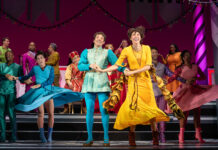
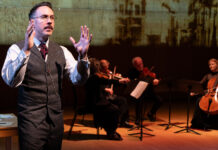
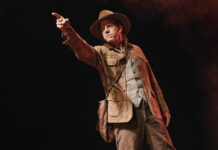
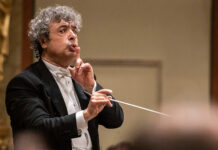




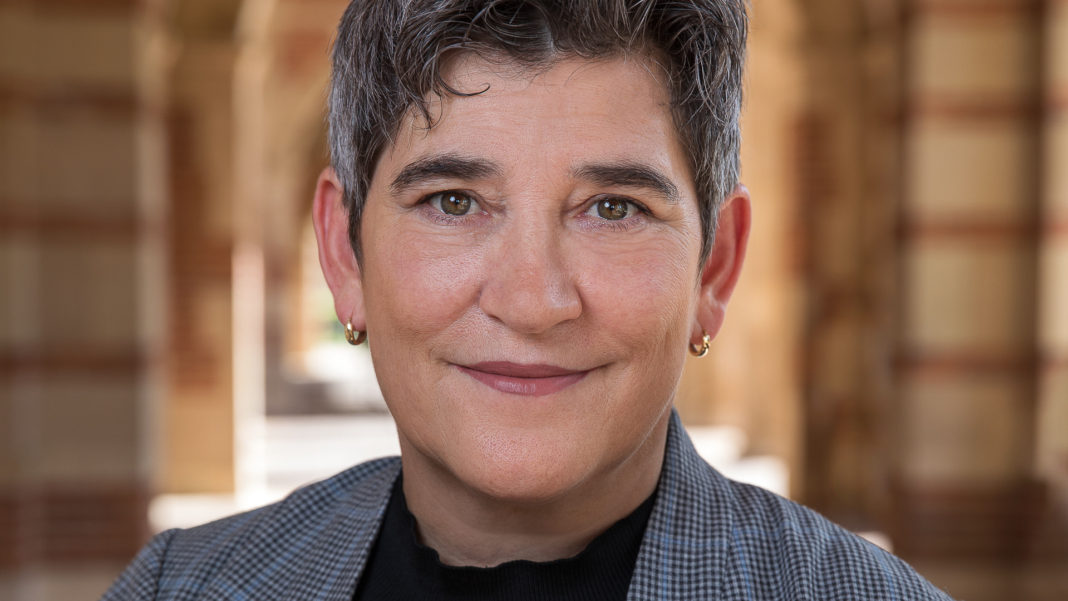
[…] Kristy Edmunds interview […]